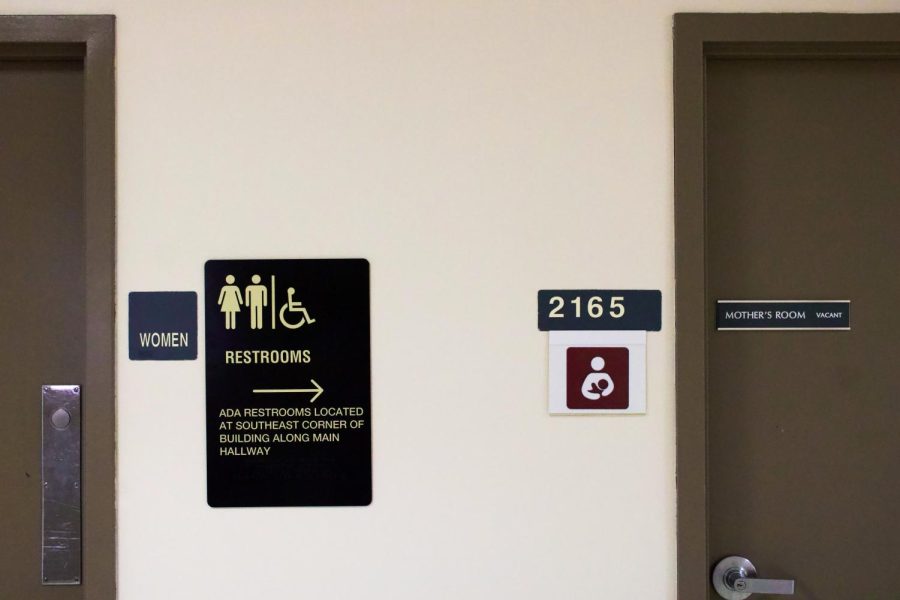Barney: Everyone Needs to go to the Bathroom
Bathroom doors in the Joseph F. Merrill Engineering Building at University of Utah in Salt Lake City on Friday, Nov. 18, 2022. (Photo by Sophie Felici | The Daily Utah Chronicle)
November 21, 2022
Everybody needs to use the bathroom.
The University of Utah isn’t necessarily bad in terms of offering gender-neutral and inclusive bathrooms. Other universities aren’t as accommodating. But bathroom accessibility and utility aren’t unique to the LGBTQ+ community, as it also impacts cisgender women and other groups who just want to use the bathroom comfortably.
As a student, you shouldn’t have to go to another building to do something as basic as use the bathroom. We should focus on restrooms being a utility for everyone rather than their gendered designation.
As of now, several buildings on campus have no gender-neutral bathrooms. This is better than it once was, but we need more across campus. Buildings like the Merrill Engineering Building have significantly fewer women’s restrooms than men’s, owed in part to the fact that fewer women make up STEM majors.
Most buildings on the lower side of campus lack lactation rooms and family restrooms. While many men’s restrooms have baby changing stations on campus, quite a few don’t.
The first gender-neutral bathroom on campus was constructed only a handful of years ago. Existing buildings see this issue more often, since they were constructed without genderless restrooms in mind. The Merrill Engineering Building also lacks such restrooms due to the age of the building, but this is unacceptable. The building has experienced construction for remodel several times and the ratio of restrooms has remained the same.
We should promote restroom inclusivity for utility — everyone needs a bathroom regardless of background. Nonbinary and trans people need to be able to use the restroom in safety. In places like the Merrill Engineering Building, two of the men’s restrooms should get converted into a genderless and women’s restroom to make the ratios more even.
When constructing new restrooms, we must keep in mind families and members of the LGBT community. Luckily, the situation has been improving. According to Shelby Hearn, the LGBT Resource Center coordinator of education and leadership development, “For building renovations or new construction all-gender restrooms are generally included in the planning … There is an Inclusive Restroom Design Committee, composed of individuals in different areas of university administration, who help guide building managers and the contractors the university works with on designing inclusive restrooms.”
As students, we could get involved with organizations such as the LGBT Resource Center to help make a change. Gender-neutral restrooms are essentially just family restrooms, so creating more also helps parents on campus. Hearn continued, “Most single stall all-gender restrooms on campus were originally designated ‘family restrooms’ and already had changing tables. Future builds also include them, because caring for a child isn’t designated to just one gender.”
Really, every restroom should have a baby changing station — this applies to the men’s restrooms on campus too. Students with children already have enough on their plates. It’s completely unreasonable to expect them to embark on an odyssey every time they need to change their child.
The lack of lactation rooms is unacceptable. Anyone who needs the utility should not have to go to a different building to use it.
Optimally, every building on campus should have a 1:1:1 ratio of restrooms. This needs to be extended to parents and everyone in general. Every building should also have a lactation room. Right now, more funding needs to go toward either converting existing bathrooms into gender-neutral and family bathrooms or constructing new bathrooms. Leadership within the university should make this a priority.
Given the size of our university, these are not unreasonable expectations. The U is a major research university in an urban area. Having utilities for every group of students is the bare minimum in this case. There is a valid reason for not having these utilities in the past, but continuing to not have them is intentional negligence.
“Being denied access to public space means being denied community, resources, employment, etc. … We advocate for inclusive policies and take part in various campus task forces and committees to do so,” Hearn said. The denial of utility for any group means rejecting that group from your space. If the U is genuinely inclusive, it should have restrooms for everyone.
You’ve got to go when you’ve got to go. The U needs to make sure that every one of their students has equal access to bathrooms and utilities across campus. That there are buildings without bathrooms for any group of people is a complete tragedy. It’s time we do something about it.













